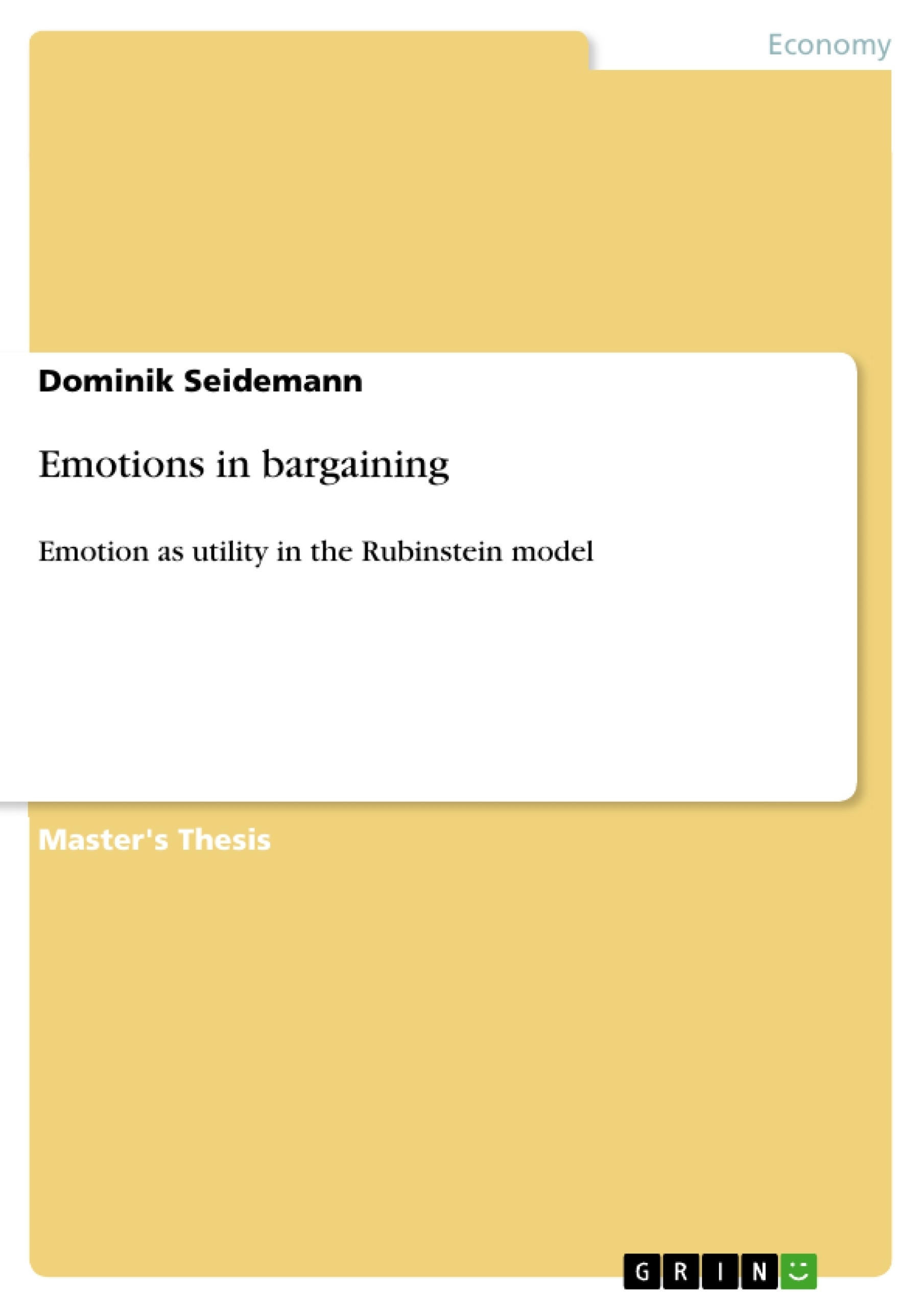Mit der vorliegenden Arbeit wurde die Verknüpfung von bekannten Verhandlungsmodellen der Spieltheorie mit verschiedenen Ansätzen zur Untersuchung des Einflusses von Emotionen auf den Verhandlungsausgang betrachtet. Zu Grunde liegt das Rubinsteinspiel, das im ersten Teil genauer erklärt wird.
In der Literaturbetrachtung des zweiten Teils werden verschiedene Artikel zusammengefasst, die in der Motivation geschrieben wurden die tatsächliche Beobachtung von Emotionen in verhandlungstheoretischen Experimenten zu erklären und Modelle (weiter) zu entwickeln, die diesen Beobachtungen Rechnung tragen. Im dritten Teil wird am Beispiel einer spezifischen Verhandlungssituation – dem Verhandeln über den Lohn eines Berufseinsteigers– der Einfluss von Emotionen mit Inspiration aus der Literatur intersucht. Ebenfalls wird ein Modell vorgestellt, das den Ausgang von spezifischen Verhandlungssituationen genauer nachstellen kann.
With the present work, the combination of well-known bargaining models of game theory with different approaches to study the influence of emotions on the outcome of negotiations was observed. Basis is the Rubinstein game that is explained in detail in the first part. The second part concludes various items which were written in the motivation to explain the observations of emotions made in actual bargaing-theoretical experiments, and to develop models that take those observations into account. In the third part a specific negotiation situation is exemplary represented- the bargaining over wages of a job applicant- to observe the influence of emotions, inspired by the methods of the literature investigated earlier. Moreover, a model is presented which can calculate the output of specific negotiation situations more accurately.
Inhaltsverzeichnis (Table of Contents)
- Introduction
- A case of negotiation
- Two possible outcomes and emotions
- Bargaining theory
- An introduction into game theory
- A simple game and dominant strategies
- The Nash equilibrium and the sub-game perfect equilibrium
- Pure and mixed strategies
- Games in bargaining theory
- Cooperative bargaining and the Nash bargaining solution
- The Rubinstein model: a non-cooperative game
- Introduction and example
- Equilibrium
- Implementing alternative utilities
- Uniqueness of equilibrium
- Emotions in bargaining- theory – an overview
- Incorporating fairness into game theory and economics – Matthew Rabin (1993)
- Modeling altruism and spitefulness in experiments – David K. Levine (1998)
- A theory of fairness, competition and cooperation – Ernst Fehr and Klaus Schmidt (1999)
- A theory of equity, reciprocity and competition – Gary E. Bolton and Axel Ockenfels (2000)
- Bargaining with reference dependent preferences –Compte and Jehiel (2003)
- Introducing social norms in game theory – Raúl López-Pérez (2007)
- Bargaining with history-dependent preferences – Duohze Li (2007)
- Strategic extremism: bargaining with endogenous breakdown probabilities and order of play – Elie Appelbaum (2008)
- How to bring emotions into bargaining – feasible models of negotiation for a higher wage
- Comparing two outcomes - a closer look
- Modelling two outcomes
- Possible outcome one: leaving in anger
- Possible outcome two: the terror regime
- A general model for the emotional negotiation for wages
- How a model for emotional bargaining could look like
- An alternative form
- The interplay of emotions and bargaining models in game theory.
- Exploring how to incorporate emotional factors into traditional bargaining models.
- Analyzing the specific negotiation scenario of salary bargaining for a new graduate.
- Developing a model to simulate the impact of emotions on negotiation outcomes.
- Examining the potential implications of emotions for the dynamics of bargaining and its outcomes.
Zielsetzung und Themenschwerpunkte (Objectives and Key Themes)
This master thesis explores the intersection of traditional bargaining models in game theory with various approaches that study the influence of emotions on negotiation outcomes. It draws upon the Rubinstein game as its foundation and delves into the literature that aims to explain observed emotions in experimental bargaining settings, further developing models to account for these observations. The thesis examines the impact of emotions in a specific negotiation situation – salary bargaining for a new graduate – drawing inspiration from the existing literature. It also proposes a model capable of more accurately simulating the outcomes of particular negotiation scenarios.
Zusammenfassung der Kapitel (Chapter Summaries)
The first chapter provides an introduction to game theory, detailing concepts such as dominant strategies, the Nash equilibrium, and sub-game perfect equilibrium. The second chapter examines cooperative and non-cooperative bargaining models, with a focus on the Rubinstein model. It explores the equilibrium solutions and considers the incorporation of different utility functions to represent emotional factors. The third chapter provides an overview of key research on emotions in bargaining, including work by Rabin, Levine, Fehr and Schmidt, Bolton and Ockenfels, Compte and Jehiel, López-Pérez, Li, and Appelbaum. This section highlights the diverse approaches to incorporating fairness, altruism, spitefulness, equity, reciprocity, social norms, and history-dependent preferences into bargaining models.
Schlüsselwörter (Keywords)
The main keywords and focus topics of this thesis include: bargaining theory, game theory, emotions, negotiation, fairness, altruism, spitefulness, equity, reciprocity, social norms, history-dependent preferences, reference-dependent preferences, Rubinstein game, Nash bargaining solution, Nash equilibrium, sub-game perfect equilibrium, strategic extremism, emotional bargaining, salary negotiation.
Frequently Asked Questions
What is the main objective of this thesis on bargaining?
The thesis explores how traditional game theory bargaining models can be combined with emotional factors to better explain real-world negotiation outcomes.
What is the Rubinstein model in bargaining theory?
The Rubinstein model is a non-cooperative bargaining game that serves as a foundation for analyzing how parties reach equilibrium in negotiations over time.
Which emotions are considered in the game theoretical models?
The models incorporate social preferences and emotions such as fairness, altruism, spitefulness, equity, and reciprocity.
How does the thesis apply these theories to real-world scenarios?
It examines a specific case of salary negotiation for a new graduate to observe the influence of emotions on the final wage agreement.
What are some key concepts of game theory mentioned?
Key concepts include the Nash equilibrium, sub-game perfect equilibrium, dominant strategies, and the difference between pure and mixed strategies.
- Citar trabajo
- Dominik Seidemann (Autor), 2014, Emotions in bargaining, Múnich, GRIN Verlag, https://www.grin.com/document/295055



